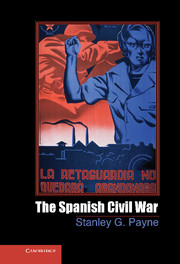Book contents
- Frontmatter
- Contents
- Chronology of Major Events
- Glossary
- Preface
- Introduction Civil War in Twentieth-Century Europe
- 1 Modernization and Conflict in Spain
- 2 From Revolutionary Insurrection to Popular Front
- 3 The Breakdown of Democracy
- 4 The Military Insurrection of the Eighteenth of July
- 5 The Battle of Madrid – the First Turning Point
- 6 Revolution
- 7 Terror
- 8 A War of Religion
- 9 Franco's Counterrevolution
- 10 Foreign Intervention and Nonintervention
- 11 Soviet Policy in Spain, 1936–1939
- 12 The Propaganda and Culture War
- 13 A Second Counterrevolution? The Power Struggle in the Republican Zone
- 14 The Decisive Northern Campaigns of 1937–1938
- 15 The War at Sea and in the Air
- 16 Civil Wars within a Civil War
- 17 The War in Perspective
- Conclusion Costs and Consequences
- Select Bibliography
- Index
- References
1 - Modernization and Conflict in Spain
Published online by Cambridge University Press: 05 September 2012
- Frontmatter
- Contents
- Chronology of Major Events
- Glossary
- Preface
- Introduction Civil War in Twentieth-Century Europe
- 1 Modernization and Conflict in Spain
- 2 From Revolutionary Insurrection to Popular Front
- 3 The Breakdown of Democracy
- 4 The Military Insurrection of the Eighteenth of July
- 5 The Battle of Madrid – the First Turning Point
- 6 Revolution
- 7 Terror
- 8 A War of Religion
- 9 Franco's Counterrevolution
- 10 Foreign Intervention and Nonintervention
- 11 Soviet Policy in Spain, 1936–1939
- 12 The Propaganda and Culture War
- 13 A Second Counterrevolution? The Power Struggle in the Republican Zone
- 14 The Decisive Northern Campaigns of 1937–1938
- 15 The War at Sea and in the Air
- 16 Civil Wars within a Civil War
- 17 The War in Perspective
- Conclusion Costs and Consequences
- Select Bibliography
- Index
- References
Summary
From the sixteenth to the eighteenth century, Spain experienced less internal conflict than other large Western countries such as France, England, or Germany. This changed drastically, however, with the transition to modern politics in the nineteenth century, when Spain became the most conflict-prone country in Western Europe.
The long history of Spain has been marked by extreme heights and depths. It took the Romans much longer to conquer the peninsula – nearly two centuries – than any other part of their empire, but the land they called “Hispania” then became an important and integral part of the Roman world. It is from Rome that it would derive its name, languages, laws, culture, religion, and initial social development. After the breakup of Rome, the new kingdom of the Visigoths in what was then called “Spania” created the first of the historic nations of Europe, with a written legal code and the beginning of a new identity and institutional structure. Yet the Visigoths were never able to achieve political unity, and internal division contributed greatly to their sudden overthrow.
The course of Spanish history was drastically altered in 711, when a Muslim invasion overthrew the Visigothic monarchy and soon occupied most of the peninsula. During the next three centuries, most of the country became religiously and culturally Islamic, part of the Middle Eastern world centered on Mecca and Bagdad. Small, isolated Christian communities survived only with the greatest difficulty in the northern mountains, but they slowly became stronger until they eventually reconquered the entire peninsula. This was the only significant case in world history in which a major territory was not merely conquered militarily by Muslims, but also religiously and culturally Islamicized, and then was completely reconquered by a portion of its native population, who not merely expelled the intruders, but also restored their own religion and culture. Had the Spanish never achieved anything else in all their history, this alone would have made them unique in human annals.
- Type
- Chapter
- Information
- The Spanish Civil War , pp. 5 - 23Publisher: Cambridge University PressPrint publication year: 2012



